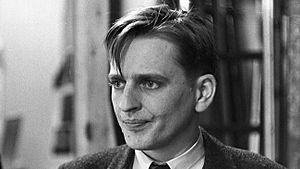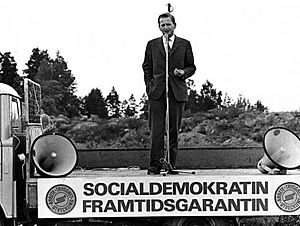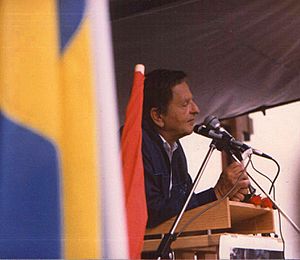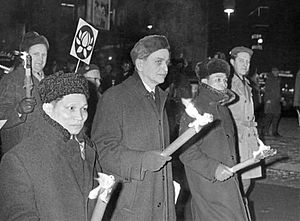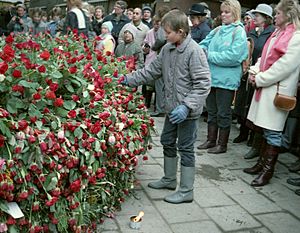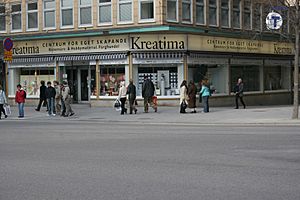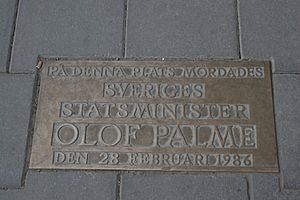Olof Palme facts for kids
Quick facts for kids
Olof Palme
|
|
|---|---|
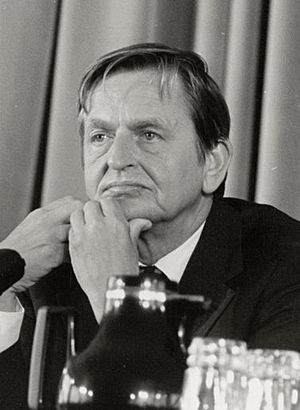
Palme in 1984
|
|
| Prime Minister of Sweden | |
| In office 8 October 1982 – 28 February 1986 |
|
| Monarch | Carl XVI Gustaf |
| Deputy | Ingvar Carlsson |
| Preceded by | Thorbjörn Fälldin |
| Succeeded by | Ingvar Carlsson |
| In office 14 October 1969 – 8 October 1976 |
|
| Monarch | Gustaf VI Adolf Carl XVI Gustaf |
| Preceded by | Tage Erlander |
| Succeeded by | Thorbjörn Fälldin |
| Leader of the Social Democratic Party | |
| In office 14 October 1969 – 28 February 1986 |
|
| Preceded by | Tage Erlander |
| Succeeded by | Ingvar Carlsson |
| President of the Nordic Council | |
| In office 1 January 1979 – 31 December 1979 |
|
| Preceded by | Trygve Bratteli |
| Succeeded by | Matthías Árni Mathiesen |
| Minister of Education | |
| In office 29 September 1967 – 14 October 1969 |
|
| Prime Minister | Tage Erlander |
| Preceded by | Ragnar Edenman |
| Succeeded by | Ingvar Carlsson |
| Minister of Communications (Transport) | |
| In office 25 November 1965 – 29 September 1967 |
|
| Prime Minister | Tage Erlander |
| Preceded by | Gösta Skoglund |
| Succeeded by | Svante Lundkvist |
| Personal details | |
| Born |
Sven Olof Joachim Palme
30 January 1927 Stockholm, Sweden |
| Died | 28 February 1986 (aged 59) Stockholm, Sweden |
| Cause of death | Assassination of Olof Palme |
| Resting place | Adolf Fredrik Church |
| Political party | Social Democratic |
| Spouses |
Jelena Rennerova
(m. 1948; div. 1952) |
| Children |
|
| Alma mater | University of Stockholm, Kenyon College |
| Signature | |
| Website | Olof Palme International Center |
| Military service | |
| Allegiance | |
| Branch/service | |
| Years of service | 1945–1947 (active) 1947–1977 (reserve) |
| Rank | |
| Unit | Svea Artillery Regiment |
Sven Olof Joachim Palme (born January 30, 1927 – died February 28, 1986) was an important Swedish politician. He served as the Prime Minister of Sweden twice. His first term was from 1969 to 1976, and his second was from 1982 until his death in 1986.
Palme also led the Swedish Social Democratic Party from 1969 until he was murdered in 1986. He was a close helper to the previous Prime Minister, Tage Erlander. Palme became Prime Minister himself in 1969.
He lost power after the 1976 election, which ended 40 years of his party being in charge. While not Prime Minister, he worked for the United Nations to help end the Iran–Iraq War. He was also President of the Nordic Council in 1979.
Palme returned as Prime Minister after winning elections in 1982 and 1985. He stayed in office until he was killed.
Olof Palme was a very important and sometimes controversial person in Sweden and in global politics. He believed Sweden should not take sides with big world powers. He supported many groups fighting for freedom after countries gained independence. He also supported several developing countries.
He was the first Western leader to visit Cuba after its revolution. He gave a speech there praising the Cuban revolutionaries. Palme often criticized how the Soviet Union and America acted in other countries. He spoke out against powerful countries trying to control others. He also spoke against strict governments in Spain, Chile, the Soviet Union, Portugal, and Czechoslovakia.
Most notably, he strongly criticized South Africa's apartheid system. He called it "a particularly gruesome system." In 1972, he spoke out against American bombings in Hanoi. He compared them to other terrible events in history. This caused a temporary break in relations between Sweden and the United States.
Palme's murder on a Stockholm street on February 28, 1986, shocked Sweden. It was the first time a Swedish leader had been murdered since 1792. This event had a huge impact across Scandinavia. A man named Christer Pettersson was first found guilty, but later found innocent.
In 2020, investigators said they believed Stig Engström, also known as "Skandia Man," was the killer. Engström had died in 2000. Because he was no longer alive, the case was closed. However, many people still question this conclusion.
Contents
Early Life and Education
Olof Palme was born in Stockholm, Sweden, into a well-off family. His father passed away when Olof was only seven years old. Even though his family was wealthy, his ideas about politics were shaped by Social Democratic beliefs.
His travels to developing countries and the United States helped him form these views. In the U.S., he saw a lot of economic inequality and racial segregation.
As a child, Olof was often sick. He was taught at home by private tutors. He learned to speak both German and English very well. He went to Sigtunaskolan Humanistiska Läroverket, a special high school in Sweden. He passed his university entrance exams at age 17.
In 1945, he joined the Army for his required military service. He served until 1947 and later became a reserve officer. After his military service, he went to Stockholm University.
College Years and Influences
In 1947, Palme received a scholarship to study at Kenyon College in Ohio, USA. He graduated with a Bachelor of Arts degree in 1948. He was inspired by the lively discussions among students there. He wrote an essay criticizing a book called The Road to Serfdom.
After college, he traveled across the U.S. and Mexico. He met Walter Reuther, a leader of the United Auto Workers union. Palme often said that his time in the United States made him a socialist. He meant that he was inspired by the ideas of fairness and equality he saw there.
He returned to Sweden and studied law at Stockholm University. In 1949, he joined the Swedish Social Democratic Party. He became active in student politics and was elected President of the Swedish National Union of Students in 1952. He focused on international issues and traveled a lot in Europe.
Palme said three main things made him a social democrat:
- A debate he attended in 1947 about taxes.
- Seeing the big differences between rich and poor in the U.S. and the racism against Black people.
- A trip to Asia in 1953. This trip showed him the effects of colonialism and imperialism.
Palme did not believe in God; he was an atheist.
Political Journey
In 1953, Prime Minister Tage Erlander asked Palme to work in his office. Palme became a member of parliament in 1957. In the early 1960s, he worked on aid for developing countries and educational support.
In 1963, he became a minister without a specific department. He continued to advise Prime Minister Erlander closely. In 1965, he became the Minister of Communications. He was very interested in developing radio and television while keeping them independent.
In 1967, he became Minister of Education. The next year, he faced criticism from students protesting university reforms. Palme went to the student protests and encouraged them to use democratic ways to achieve their goals. When Tage Erlander retired in 1969, Palme was chosen as the new leader of the Social Democratic party. He then became Prime Minister.
Palme was very popular with people who had left-leaning views. However, some liberals and conservatives strongly disliked him. This was partly because of his international actions, especially his criticism of U.S. foreign policy. It was also due to his direct and strong debating style.
Key Policies and Beliefs
As a leader of a new generation of Swedish Social Democrats, Palme was seen as a "revolutionary reformist." He called himself a progressive. In Sweden, his left-leaning ideas, especially about giving workers more say in businesses, caused some conflict with the business community.
During his time as Prime Minister, Sweden's constitution was changed. In 1971, the parliament changed from having two chambers to one. In 1975, a new constitution was created. This officially made Sweden a parliamentary democracy. It also removed all formal political powers from the monarchy.
His changes to the job market included a law that made jobs more secure. In the 1973 election, the socialist-communist parties and the liberal-conservative parties each won 175 seats in parliament. Palme's government continued to lead, but sometimes they had to draw lots to decide on issues. However, most important issues were agreed upon by compromise.
Taxes in Sweden also increased to some of the highest levels in the Western world.
Social Reforms
Under Palme's leadership, there was a lot of focus on child care centers and social security. Protecting the elderly, ensuring accident safety, and solving housing problems were also important. Sweden's public health system became very efficient. The number of babies dying was very low.
A big program was started to share wealth more fairly. Special help was given to people with disabilities, immigrants, low-paid workers, single-parent families, and the elderly. The Swedish welfare state grew a lot during his time in office.
For example, old-age pensions increased significantly. A health care reform in 1974 made all health services work together better. It also increased the minimum amount of money people received when sick. In 1974, extra help for unemployment was created for workers who didn't qualify for other benefits.
In 1971, it became easier for older workers (over 60) to get disability pensions. Universal dental insurance was introduced in 1974. Old maternity benefits were replaced with a parental allowance. Housing allowances for families with children were raised. Childcare centers also expanded.
Worker's Rights and Economy
Many changes were made to improve workers' rights. A law in 1974 gave unions more say in company decisions. It also set rules for notice periods and reasons for firing. Grants were given to companies to improve work environments. This was if they had union-appointed "safety stewards" to check new technology for worker safety.
In 1976, a law was passed that allowed unions to be consulted on many company matters. Management had to negotiate with workers on how work was organized, hiring and firing, and other key decisions.
Palme's last government faced a difficult economy in Sweden. They tried a "third way" approach. This was meant to encourage investment, production, and jobs. It avoided traditional economic policies because of growing debt. This approach involved "equality of sacrifice." This meant wage limits would go along with more welfare and fairer taxes.
For example, taxes on wealth, gifts, and inheritance went up. Tax benefits for shareholders were reduced or removed. Welfare cuts made before Palme returned to office were reversed. The system of adjusting pensions for inflation was brought back. Unemployment insurance was fully restored. Increases were made to food subsidies and child allowances.
Other Contributions
In 1968, Palme helped release a documentary film called Dom kallar oss mods ("They Call Us Misfits"). This film showed two people who didn't fit into society. Palme believed the film was too important to be cut.
Palme was a strong supporter of gender equality. He attended a World Women's Conference in Mexico. He also gave a speech called "The Emancipation of Man" in 1970. This speech helped bring attention to women's rights.
He also supported nuclear power as a necessary energy source. He believed it was important for a time to reduce the use of fossil fuel. His actions in Sweden's 1980 vote on nuclear power are often seen as saving it. Nuclear power is still an important energy source in Sweden today.
Relations between the Soviet Union and Sweden were difficult during Palme's second time as prime minister. This was especially due to reports of Soviet submarines entering Swedish waters.
On the world stage, Palme was a well-known political figure. He was known for:
- Strongly criticizing the United States over the Vietnam War.
- Speaking out against the Soviet Union stopping the Prague Spring.
- Criticizing Communist governments in Europe.
- Campaigning against the spread of nuclear weapons.
- Criticizing the Franco Regime in Spain.
- Opposing apartheid in South Africa. He called it "a particularly gruesome system." He supported economic sanctions against South Africa.
- Supporting, both politically and financially, groups like the African National Congress (ANC) and the Palestine Liberation Organization (PLO).
- Visiting Fidel Castro's Cuba in 1975. He praised the Cuban revolutionaries there.
- Strongly criticizing the Pinochet regime in Chile.
- His role as a mediator in the Iran–Iraq War.
All these actions meant Palme had many supporters and opponents around the world.
On February 21, 1968, Palme, who was then Minister of Education, joined a protest in Stockholm. This protest was against the U.S. involvement in the Vietnam War. He was with the North Vietnamese ambassador. As a result, the U.S. removed its Ambassador from Sweden. Palme was also strongly criticized by the opposition for joining the protest.
On December 23, 1972, Palme, as Prime Minister, gave a speech on Swedish radio. He compared the U.S. bombings of Hanoi to other terrible events in history. The U.S. government called this comparison a "gross insult." They again stopped diplomatic relations with Sweden for over a year.
Assassination
Political violence was very rare in Sweden at that time. Olof Palme often walked around without bodyguards. Close to midnight on February 28, 1986, he was walking home from a movie theater. He was with his wife, Lisbeth Palme, on a street in central Stockholm called Sveavägen. He was shot and killed. Lisbeth was also wounded.
He was declared dead at the hospital shortly after midnight. Lisbeth survived without serious injuries.
Ingvar Carlsson, the Deputy Prime Minister, immediately took over as Prime Minister. He remained in that role until 1991. He also became the leader of the Social Democratic Party.
Two years later, Christer Pettersson, a criminal, was found guilty of Palme's murder. However, his conviction was later overturned. Another suspect, Victor Gunnarsson, moved to the United States. He was murdered there in 1993 in an unrelated event. The assassination of Olof Palme remained unsolved for a long time.
On June 10, 2020, Swedish prosecutors announced that they knew who killed Palme. They named Stig Engström, also known as "Skandia Man," as the assassin. Engström was one of about twenty people who claimed to have seen the assassination. He was later identified as a possible suspect by Swedish writers. Since Engström died in 2000, the authorities announced that the investigation into Palme's death was closed.
Images for kids
-
Palme's grave in Stockholm's Adolf Fredrik cemetery
See also
 In Spanish: Olof Palme para niños
In Spanish: Olof Palme para niños
- List of Olof Palme memorials
- Olof Palme International Center
- Olof Palme Prize
- List of peace activists
- Anna Lindh
- Bernt Carlsson
- Folke Bernadotte
- IB affair, a political scandal involving Palme.
- Ebbe Carlsson affair, a political scandal concerning non-official inquiries into the murder.
 | Anna J. Cooper |
 | Mary McLeod Bethune |
 | Lillie Mae Bradford |


